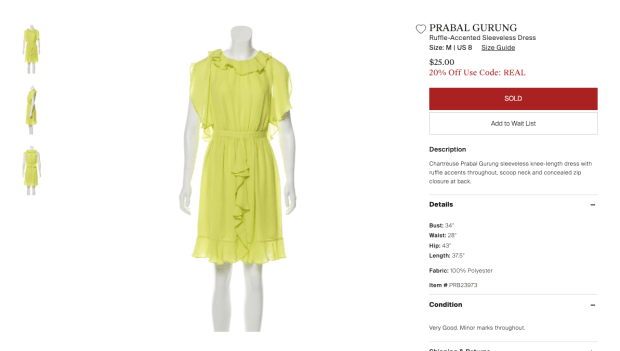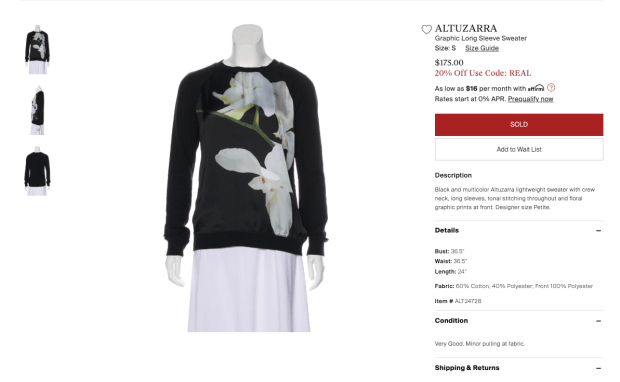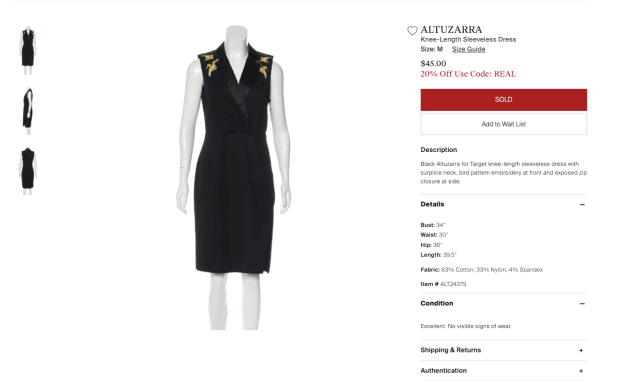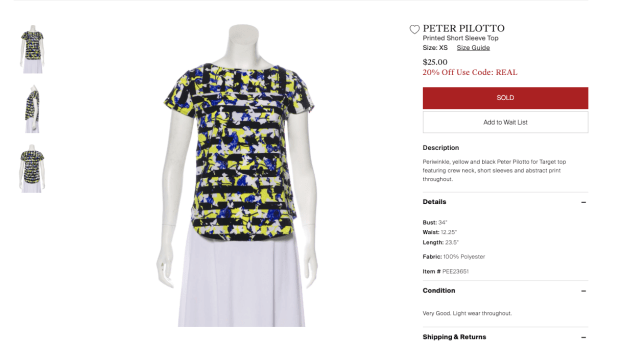Hey, Quick Question: Why Is The RealReal Selling Unmarked Target Designer Collaborations?
"I think at a minimum, this is absolutely misleading marketing."

Scrolling through online luxury retail reseller The RealReal, users might stumble upon what appears to be a perfect wedding guest dress: a lemon-lime number with playful ruffles, it's a steal for a Prabal Gurung piece, originally listed at $165 (since changed to $25). Since its inception in 2011 as a premiere resale site for contemporary and luxury fashion labels, The RealReal has listed and sold hundreds of items designed by Prabal Gurung. (A dress similar to the one seen above is listed at $1,695.) However, this isn't a genuine Prabal Gurung dress, but a piece from the brand's 2013 collaboration with Target. It originally sold for $39.99 at the mass-market retailer.
These mass-market retailer partnerships offer consumers a taste of designer goods for a fraction of what their meticulously-crafted luxury counterparts go for — and despite The RealReal's image as a trustworthy assessor of authenticity in the consignment market, it appears the brand has a pattern of mislabeling pieces from Target collaborations as though they are designer goods.
Reporters found these kinds of misleading listings throughout the site in at least 10 separate cases and spanning five different high-end designer brands: a pair of Victoria Beckham trousers that Target sold for $40 was sold for $275 on The RealReal; an Altuzarra for Target sweater listed for $49.99 at Target sold for $175 on The RealReal; a Peter Pilotto for Target printed sweatshirt was priced at $29.99, and sold on TheRealReal for $205.

When reporters reached out to The RealReal for comment, the brand significantly lowered the pricing of some of the Target collaboration items still for sale (as well as two previously sold items) and added specification to current listings to clarify that these pieces were not from designers' own lines. Christine Heerwagen, a publicist for The RealReal, said the brand "recognize[s] the opportunity to improve transparency here," and has "updated our product pages for designer collaboration pieces with more detailed information."
The RealReal's promises of total transparency and authenticity permeate every level of its marketing language and visuals, starting with the double "real" in the name. Frequent uses of the descriptor "authenticated luxury consignment" appear on the site alongside a 100% authenticity guarantee. A dedicated landing page listing the 61 'authentication experts, horologists and gemologists" introduces the staff tasked with verifying luxury goods for resale. The RealReal is also using its focus on luxury and authenticity expertise to attract potential investors as it prepares for what it hopes will be a $285 million IPO.
An email sent from The RealReal and obtained by reporters uses language to reinforce the same suspect promise: "Authenticity Guaranteed," the subject line reads, adding "our experts inspect every item." An email invitation for prospective consignors plugs a "white glove consultation" in which a "luxury manager" arranges an in-person meeting to evaluate merchandise.
"I think that's one of [The RealReal's] big marketing points is that you can trust them," says Bonnie Patten, Executive Director of Truth in Advertising. "And I think that the way they evidence that on their website is by giving you the biographies of a multitude of — I'm putting air quotes — 'experts' that they say work for the company to insure that what they're selling on their website is what they say it is."
Of the mislabeled Target collaboration items identified by reporters, all of them were marked up above their original retail prices, sometimes as much as roughly seven times the initial pricing. While the practice of marking up items for resale is hardly uncommon, these instances on The RealReal are especially eyebrow-raising because the items are not labeled accurately. Consumers are led to believe that they're purchasing items created by luxury designer houses, not fast-fashion equivalents made via partnership deals.

One of the three pieces that the reporters found from the 2014 Altuzarra for Target collection is an embroidered black dress with gold accents. The dress originally sold at Target for $49.99. Prior to reporters reaching out for comment, the same dress appeared on The RealReal, mislabeled under the main Altuzarra line and marked for sale at $245 – five times the original price. The day after reporters reached The RealReal for comment, the brand adjusted the piece down to $31.50, marked down from $45.

A patterned Peter Pilotto for Target top was released in 2014 and originally sold for $29.99. The same top was for sale on The RealReal, labeled as an original Peter Pilotto piece for $125 and discounted at $62.50. As with the other items, the price changed after reporters reached out to the company, and this listing has been updated to specify that it’s from a Target collaboration. Now, it’s listed at a $25 price, discounted at $12.50. A sweater from the same collection is listed as having sold at $205.
Under the authentication tab of each garment's sidebar, the site promises: "This item has been evaluated by an Authentication Specialist. Our 100+ Experts inspect thousands of items every day, so you can be sure each item is 100% authentic." Not all brands whose items land on The RealReal agree. A representative for Altuzarra confirmed that the above three pieces identified on The RealReal as Altuzarra are, in fact, not from their standard brand but from the 2014 Target collaboration. A representative from Altuzarra declined to comment on the practice of mislabeling pieces, while a representative from Prabal Gurung said the brand has "no control" over what is sold on consignment sites. The other three brands reporters reached out to did not give statements and Target declined to confirm.
Heerwagen of The RealReal says that the mislabeling of items is part of the company's "testing" of potential new markets, adding that the brand is 'considering permanently accepting Target collaborations with luxury designers who are part of our accepted designer list."

"Online resellers like The RealReal have become the arbiters of authenticity, since there is no governing body to provide an authorized answer on the legitimacy of fashion items," said Tessa Maffucci, a professor at Pratt Institute. Some of the biggest names in the fashion industry, like Jenna Lyons and Stella McCartney, have thrown their stamp of approval behind The RealReal, collaborating with the reseller.
Although The RealReal enjoys support from fashion heavyweights, it's not universally respected inside the industry. Chanel filed a lawsuit in late 2018 alleging that The RealReal is misleading consumers by selling counterfeit handbags. (In the response The RealReal filed in court, the brand argues that the authenticity guarantee was not designed to be "woodenly interpreted.") The RealReal's "Limitations of Liability" fine print further undermines the claim of 100% authenticity. The terms section states that "neither the Consignor nor [The RealReal], nor any of our officers, employees or agents" are responsible for the "correctness of any statement of whatever kind concerning any piece whether written or oral nor for any other errors or omissions in description."
Other controversies surround the brand online as well. Diet Prada, the watchdog Instagram account with 1.3 million followers known within the fashion industry for calling out any missteps, has challenged The RealReal in the past for failing on its authentication guarantees. Of a dress mislabeled as Prada, Diet Prada wrote: "For priding yourselves on authenticity, there certainly seems to be some pieces slipping through the cracks of your designer resale business."
A LinkedIn job posting for The RealReal lists one of the authenticator role's responsibilities as verifying 100+ luxury consignment pieces daily. In a standard eight or nine hour work day, that requirement means that The RealReal's authenticators spend an average of three to five minutes evaluating each item.
As to whether or not the mislabeling of Target pieces on The RealReal is a legal violation, Patten believes it's possible. "Broadly speaking, the Federal Trade Commission and all 50 states have laws to protect consumers from misleading marketing," Patten said, adding that "the way they are intentionally excluding the 'for Target' part of this is an issue."
"I think at a minimum, this is absolutely misleading marketing."
Want the latest fashion industry news first? Sign up for our daily newsletter.
